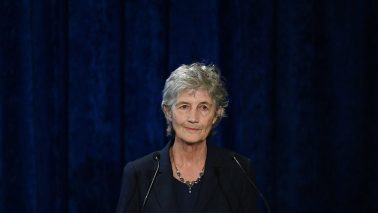
Gwyneth Williams on delivering the World Service
Monday: the nine o’clock meeting. I have measured out my days with BBC meetings, and none rivals this. It is the queen of meetings, a jewel; a crisp attempt to order the world coupled with a dark humour acknowledging the absurdity of the task. This is, after all, the World Service newsroom at work: driven by a deeply felt mission to unpick and explore, decode and analyse, above all tell our 40 million weekly English listeners and the 143 million in other languages what is going on. It is parody and irony, occasional brilliance, wit and wisdom, daily and all in 40 minutes.
I come in late and prop myself on the table at the back of the windowless room. All the nations of the world are here, arranged in dense format in a large square. The newsroom chief opens proceedings. We go round the room: Newsgathering is quietly pleased to have got us into Zimbabwe in spite of the ban; the formidable Olexiy Solohubenko was the first to tell us recently that the new Russian president is known on the street as the nano president; Pakistan is briskly decoded by Nazes Afroz who also tells us of plans to tone down sex education in India since their flip charts are seen as too graphic. Then Monitoring; they have been waiting patiently on a video screen at Caversham from where they listen to the world’s airwaves in all languages. Gaza? A sigh. Now I need coffee from Henri on the first floor.
Tony Banks, when he was sports minister, said that was his dream job — because of the football tickets. The World Book Club makes my position, Director of the English World Service, my dream job. I have so far encountered Umberto Eco, Sara Paretsky and Patricia Cornwell. On Thursday in Studio S6 in the Bush House basement, Khaled Hosseini discussed The Kite Runner. I have just finished reading another of his books, A Thousand Splendid Suns, about Afghanistan. He tells the story of two women which everyone should read if they want to know why our troops seem to be running into trouble there. The trick of the Book Club is to be highbrow (no author is deemed too clever) but to choose the most famous and popular books. Presenter and academic Harriett Gilbert wears her lit crit lightly, infusing the programme with a deep-voiced authority. How do we at the World Service manage to conceal this and other gems so well?
This month is schedule change: our clocks on all 13 English networks alter to take into account summer time. It is also our chance to make a few changes without causing too much inconvenience to listeners; although frankly if you are not up to inconvenience as a World Service listener, you probably have dropped off long ago. Distribution is thorny as short wave, I am told, is falling in popularity and the local FM rebroadcasting stations have a very short range. Please Alec Broers (one of the Reith lecturers I have edited), can you help? You are a brilliant scientist and engineer and, crucially, chairman of the House of Lords science and technology committee. I know that as a serious, Atlantic-crossing sailor you are a big WS fan. You must know someone who can come up with a quick fix.
Clock change is also when we bring in the new. We have new presenters in Alan Johnston with From Our Own Correspondent, Matthew Bannister for the relaunched daily Outlook and Bridget Kendall on a new weekly show, The Forum; scientist Susan Greenfield will sometimes present this too. The aim is to talk about ideas across subjects and around the world. Ideas cross borders and boundaries in all senses, just like the World Service. As globalisation unfolds we are at the heart of a new way of seeing the world. English is spreading, as George Steiner put it, like a whitewash around the globe. Our English Learning department has just told me that their monthly pages viewed on the website in China was 38 million. ‘Is that a lot?’ I asked; well, Gordon Brown has asked the British Council to aim for a million, so I’ll settle for that.
It is ironic that the English WS, thought by some to be old-fashioned and rooted in the days of the empire, is a leader in the knowledge society; a uniquely global public service, demonstrating rationality in action day after day. Never have we needed more (as Daniel Barenboim, another Reith lecturer says) to ‘listen to the narrative of the other’. But the World Service is now more than a famous and loved radio network. It exists on the web, as downloaded programmes on MP3 players, as a contributor to other networks through partners around the world. Figures show that audiences go up for stations in America which take Newshour, our flagship daily current affairs programme. Our goal is not just information but understanding. Tim Berners-Lee, who founded the net, nominated us for the task: ‘As the World Wide Web gives us access to an exploding variety of information, so grows the need for an overall global view filtered with wisdom. Long may the World Service fulfil this role.’
Bush House is a different country. There is no English froideur and the basis for respect is knowledge, expertise and commitment to the truth. And we matter: as Wole Soyinka, the Nobel-prizewinning poet and, yes, another Reith lecturer, said when he handed me an unpublished poem to broadcast: ‘Listening to the World Service has become a habit.’ Or as Jeff Sachs (yet another Reithie) said when he called me from Ghana in amazement a year or so ago, ‘The check-out lady has just said, “Are you Jeff Sachs who gave the Reith lectures?”’ As I walk into my office I pass a sign which reads: ‘1300–1400, bellydancing’. I love it.





Comments